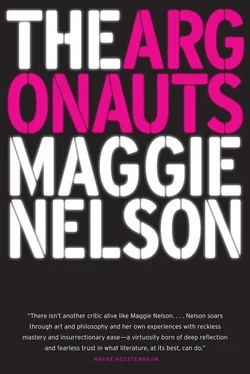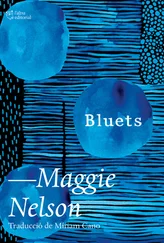It’s painful for me that I wrote a whole book calling into question identity politics, only then to be constituted as a token of lesbian identity. Either people didn’t really read the book, or the commodification of identity politics is so strong that whatever you write, even when it’s explicitly opposed to that politics, gets taken up by that machinery .
I think Butler is generous to name the diffuse “commodification of identity” as the problem. Less generously, I’d say that the simple fact that she’s a lesbian is so blinding for some, that whatever words come out of her mouth — whatever words come out of the lesbian’s mouth, whatever ideas spout from her head — certain listeners hear only one thing: lesbian, lesbian, lesbian . It’s a quick step from there to discounting the lesbian — or, for that matter, anyone who refuses to slip quietly into a “postracial” future that resembles all too closely the racist past and present — as identitarian , when it’s actually the listener who cannot get beyond the identity that he has imputed to the speaker. Calling the speaker identitarian then serves as an efficient excuse not to listen to her, in which case the listener can resume his role as speaker. And then we can scamper off to yet another conference with a keynote by Jacques Rancière, Alain Badiou, Slavoj Žižek, at which we can meditate on Self and Other, grapple with radical difference, exalt the decisiveness of the Two, and shame the unsophisticated identitarians, all at the feet of yet another great white man pontificating from the podium, just as we’ve done for centuries.
In response to a journalist who asked him to “summarize himself in a nutshell,” John Cage once said, “Get yourself out of whatever cage you find yourself in.” He knew his name was stuck to him, or he was stuck to it. Still, he urges out of it. The Argo’s parts may get replaced, but it’s still called the Argo . We may become more used to jumping into flight, but that doesn’t mean we have done with all perches. We ought to say a feeling of and, a feeling of if, a feeling of but, and a feeling of by, quite as readily as we say a feeling of blue or a feeling of cold . We ought to, but we don’t — or at least, we don’t quite as readily. But the more you do, the more quickly you can recognize the feeling when it comes around again, and hopefully you won’t need to stare as long.
Throughout my twenties, I meditated weekly at the Russian & Turkish Baths on East Tenth Street on the impossibly ancient body of the woman whom I thought of as the ghost of the baths. (If you went to these baths on women-only days in the ’90s, you will know who I mean.) I meditated on her labia, which drooped far below her pale pubic hair, her butt cheeks dangling off the bone like two deflated balloons. And I said, do labia really start to hang? She said, yes, just like men’s balls, gravity makes the labia hang. I told her I never noticed that, I’d have to take a look . I tried to learn everything there was to know about the aging female body by staring at hers. (Now I realize I should say “the elderly female body,” but in my youth, as in the culture at large, the space between “aging” and “elderly” women is often collapsed, treated as illegible or irrelevant.)
In my day job as a graduate student, however, I expressed only offense at Allen Ginsberg’s descriptions of female genitalia in his poems, as in “the hang of pearplum / fat tissue / I had abhorred” and “the one hole that repelled me 1937 on.” I still don’t see the need to broadcast misogynistic repulsion, even in service of fagdom, but I do understand being repelled. Genitalia of all stripes are often slimy and pendulous and repulsive. That’s part of their charm.
I realize now that such moments in Ginsberg have a different shine when held in the bowl alongside his go-for-broke encounter with the naked body of his mother, the mad Naomi, in his great “Kaddish”:
One time I thought she was trying to make me come lay her — flirting to herself at sink — lay back on huge bed that filled most of the room, dress up round her hips, big slash of hair, scars of operations, pancreas, belly wounds, abortions, appendix, stitching of incisions pulling down in the fat like hideous thick zippers — ragged long lips between her legs — What, even, smell of asshole? I was cold — later revolted a little, not much — seemed perhaps a good idea to try — know the Monster of the Beginning Womb— Perhaps — that way. Would she care? She needs a lover.
Yisborach, v’yistabach, v’yispoar, v’yisroman, v’yisnaseh, v’yishador, v’yishalleh, v’yishallol, sh’meh d’kudsho, b’rich hu.
When I read this passage now, I feel only moved and inspired. “What, even, smell of asshole?”—this is the sound of Ginsberg cajoling himself as far out onto the ledge as he can go, even if it means pressing into the speculative, the fictive. Beyond the “Monster of the Beginning Womb” to the mother’s anus, which he leans into and sniffs. Not in service of abjection, but in pursuit of the limits of generosity. She needs a lover — am I that name?
The result of all this pushing? “Later revolted a little, not much.” O glorious deflation without dismissal!
I remember, around age ten, beholding the scene in The Shining in which the hot young woman whom Jack Nicholson is lewdly embracing in the haunted hotel bathroom ages rapidly in his arms, screeching from nubile chick to putrefying corpse within seconds. I understood that the scene was supposed to represent some kind of primal horror. This was The Shining , after all. But the image of that decaying, cackling crone, her arms outstretched in desire toward the man who is backing away, has stayed with me for three decades, as a type of friend. She’s part baths-ghost, part mad-Naomi. She didn’t get the memo about being beyond wanting or being wanted. Or perhaps she just means to scare the shit out of him, which she does.
At one point in her book The Buddhist , Dodie Bellamy takes Jonathan Franzen to task for the following description of a middle-aged woman found in his novel Freedom: “Then she waited, with parted lips and a saucy challenge in her eyes, to see how her presence — the drama of being her — was registering. In the way of such chicks, she seemed convinced of the originality of her provocation. Katz had encountered, practically verbatim, the same provocation a hundred times before, which put him in the ridiculous position now of feeling bad for being unable to pretend to be provoked: of pitying Lucy’s doughty little ego, its flotation on a sea of aging-female insecurity.” Bellamy responds: “Due to all the stagy point of view switches the novel apparently employs, I’d thought of assigning it to students, but after reading the above passage I was like, not in 100 fucking years…. Middle aged women are such easy prey, like they’re supposed to walk around with eyes averted, hanging their heads in shame at their wreckage.” She then offers “a sappy image of a crone to wipe out the evil Franzen-view.”
I won’t reproduce the image here, but I encourage you to find The Buddhist and consult it. What I will do is tell you about the stable of people I have come to think of as my sappy crones (except that they aren’t really sappy, and they’re not really crones). You’ve already met some of them. For a while I was calling them my good witches, but that wasn’t quite right. If it weren’t such a lengthy moniker I might call them “the many gendered-mothers of my heart,” which is what poet Dana Ward calls everyone from Allen Ginsberg to Barry Manilow to his father to his grandmother to his childhood neighbor to Winona Ryder’s character in Heathers to Ella Fitzgerald to Jacob von Gunten to his bio mom in his amazing long poem “A Kentucky of Mothers,” which accomplishes the nearly impossible feat of constructing an ecstatic matriarchal cosmology while also de-fetishizing the maternal, even emptying the category out, eventually wondering: “But is ‘mother of’ precise? / Should I say ‘singers of’ instead? … Is it good to call these others as my moms the way I have? Is it care, & if it is have I gave honor in my song?”
Читать дальше












